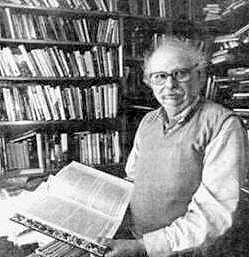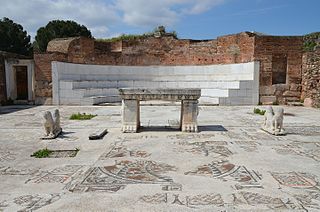
In Judaism, "chosenness" is the belief that the Jews, via descent from the ancient Israelites, are the chosen people, i.e. selected to be in a covenant with God. The idea of the Israelites being chosen by God is found most directly in the Book of Deuteronomy as the verb baḥar, and is alluded to elsewhere in the Hebrew Bible using other terms such as "holy people". Much is written about these topics in rabbinic literature. The three largest Jewish denominations—Orthodox Judaism, Conservative Judaism and Reform Judaism—maintain the belief that the Jews have been chosen by God for a purpose. Sometimes this choice is seen as charging the Jewish people with a specific mission—to be a light unto the nations, and to exemplify the covenant with God as described in the Torah.

Christianity is rooted in Second Temple Judaism, but the two religions diverged in the first centuries of the Christian Era. Christianity emphasizes correct belief, focusing on the New Covenant as mediated through Jesus Christ, as recorded in the New Testament. Judaism places emphasis on correct conduct, focusing on the Mosaic covenant, as recorded in the Torah and Talmud.

Jewish eschatology is the area of Jewish theology concerned with events that will happen in the end of days and related concepts. This includes the ingathering of the exiled diaspora, the coming of a Jewish Messiah, afterlife, and the revival of the dead. In Judaism, the end times are usually called the "end of days", a phrase that appears several times in the Tanakh.

In Judaism, the Seven Laws of Noah, otherwise referred to as the Noahide Laws or the Noachian Laws, are a set of imperatives which, according to the Talmud, were given by God as a binding set of universal moral laws for the "sons of Noah"—that is, all of humanity.
Messianic Judaism is a modern, syncretic Christian religious movement that incorporates some elements of Judaism and Jewish tradition with evangelical Christianity.

Israel Shahak was an Israeli professor of organic chemistry at the Hebrew University of Jerusalem, a Holocaust survivor, an intellectual of liberal political bent, and a civil-rights advocate and activist on behalf of both Jews and Gentiles (non-Jews). For twenty years, he headed the Israeli League for Human and Civil Rights (1970–90) and was a public critic of the policies of the governments of Israel. As a public intellectual, Shahak's works about Judaism proved controversial, especially the book Jewish History, Jewish Religion: The Weight of Three Thousand Years (1994).
Religious pluralism is a set of religious world views that hold that one's religion is not the sole and exclusive source of truth, and thus recognizes that some level of truth and value exists in other religions. As such, religious pluralism goes beyond religious tolerance, which is the condition of peaceful existence between adherents of different religions or religious denominations.
Gentile is a word that usually means "someone who is not a Jew".
Jewish religious movements, sometimes called "denominations", include different groups within Judaism which have developed among Jews from ancient times. Today, the main division is between the "traditional" branches of Judaism and the more modern Reform, with several smaller movements alongside each. This structure is mainly present in the United States and United Kingdom; in Israel, the fault lines are between Haredi Judaism (Haredim), Religious Zionism (Datim), Masortim (traditional), and Hiloni (secular) Jews.
Ger toshav is a halakhic term used in Judaism to designate the legal status of a Gentile (non-Jew) living in the Land of Israel who does not want to convert to Judaism but agrees to observe the Seven Laws of Noah, a set of imperatives which, according to the Talmud, were given by God as a binding set of universal moral laws for the "sons of Noah"—that is, all of humanity. A ger toshav is therefore commonly deemed a "Righteous Gentile", and is assured of a place in the World to Come .

Righteous Among the Nations is an honorific used by the State of Israel to describe non-Jews who risked their lives during the Holocaust to save Jews from extermination by the Nazis for altruistic reasons. The term originates with the concept of "righteous gentiles", a term used in rabbinic Judaism to refer to non-Jews, called ger toshav, who abide by the Seven Laws of Noah.

The biblical term "proselyte" is an anglicization of the Koine Greek term προσήλυτος (proselytos), as used in the Septuagint for "stranger", i.e. a "newcomer to Israel"; a "sojourner in the land", and in the Greek New Testament for a first-century convert to Judaism, generally from Ancient Greek religion. It is a translation of the Biblical Hebrew phrase גר תושב.

Dual-covenant or two-covenant theology is a school of thought in Christianity regarding the relevance of the Hebrew Bible, which Christians call the Old Testament.

Noahidism or Noachidism is a monotheistic Jewish religious movement based upon the Seven Laws of Noah and their traditional interpretations within Orthodox Judaism. According to the Jewish law, non-Jews (Gentiles) are not obligated to convert to Judaism, but they are required to observe the Seven Laws of Noah to be assured of a place in the World to Come, the final reward of the righteous. The penalty for violating any of the Noahide laws is discussed in the Talmud, but in practical terms it is subject to the working legal system which is established by the society at large. Those who subscribe to the observance of the Noahic Covenant are referred to as Bnei Noach or Noahides. The modern Noahide movement was founded in the 1990s by Orthodox rabbis from Israel, mainly tied to Chabad-Lubavitch and religious Zionist organizations, including The Temple Institute.
The world to come, age to come, heaven on Earth, and the Kingdom of God are eschatological phrases reflecting the belief that the current world or current age is flawed or cursed and will be replaced in the future by a better world, age, or paradise.

God-fearers or God-worshippers were a numerous class of Gentile sympathizers to Hellenistic Judaism that existed in the Greco-Roman world, which observed certain Jewish religious rites and traditions without becoming full converts to Judaism. The concept has precedents in the proselytes of the Hebrew Bible.
Shituf is a term used in Jewish sources for the worship of God in a manner which Judaism does not deem to be purely monotheistic. The term connotes a theology that is not outright polytheistic, but also should not be seen as purely monotheistic. The term is primarily used in reference to the Christian Trinity by Jewish legal authorities who wish to distinguish Christianity from full-blown polytheism. Though a Jew would be forbidden from maintaining a shituf theology, non-Jews would, in some form, be permitted such a theology without being regarded as idolaters by Jews. That said, whether Christianity is shituf or formal polytheism remains a debate in Jewish philosophy.
The incident at Antioch was an Apostolic Age dispute between the apostles Paul and Peter which occurred in the city of Antioch around the middle of the first century. The primary source for the incident is Paul's Epistle to the Galatians 2:11–14. Since the 19th century figure, Ferdinand Christian Baur, biblical scholars have found evidence of conflict among the leaders of early Christianity; for example, James D. G. Dunn proposes that Peter was a "bridge-man" between the opposing views of Paul and James, brother of Jesus. The final outcome of the incident remains uncertain, resulting in several Christian views on the Old Covenant.

Paul the Apostle has been placed within Second Temple Judaism by recent scholarship since the 1970s. A main point of departure with older scholarship is the understanding of Second Temple Judaism; the covenant with God and the role of works as a means to either gain or keep the covenant.








